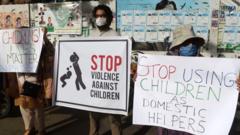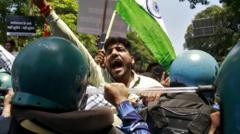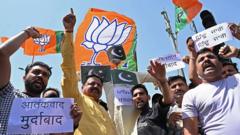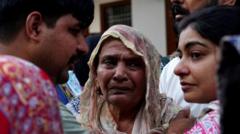The recent case involving Iqra, a 13-year-old domestic worker who reportedly suffered fatal injuries at the hands of her employers, has led to a resurgence of protests and online campaigns against child labor in Pakistan. Iqra, who started working as a maid at a young age to support her agricultural family, was accused of stealing chocolates from her employers, resulting in a brutal punishment that ultimately claimed her life. The parents of Iqra, who were in financial distress, allowed their daughter to work to help ease the family's burdens.
**Tragic Death of Child Maid Ignites Outrage in Pakistan**

**Tragic Death of Child Maid Ignites Outrage in Pakistan**
A 13-year-old girl’s death due to alleged torture by her employers for stealing chocolates has sparked national outrage and highlighted issues of child labor.
Following her death, the couple, Rashid Shafiq and his wife Sana, were detained by the police amid an investigation that revealed evidence of severe physical abuse inflicted on Iqra, including fractures and head trauma. Activists have taken to social media, decrying the trivial reason for such extreme measures, with hashtags like #JusticeforIqra illuminating the broader issue of systemic violence against domestic workers in Pakistan. The case has reignited discussions on child labor laws, which prohibit the employment of children under 15 in domestic work in the Punjab province but remain poorly enforced.
Iqra’s tragic fate reflects the dire reality faced by millions of child laborers across Pakistan, where cultural and legal frameworks often dehumanize and commodify the most vulnerable. Not only does this situation call into question the validity of existing child protection laws, but it also raises concerns about the social structures that allow such abuse to perpetuate within households.
Despite public outrage and demands for justice, Pakistan's legal system often favors financial settlements over criminal responsibility, casting doubt on whether there will be any real accountability for Iqra's death. Legal observers warn that the intertwining of socioeconomic factors with the judicial system complicates the pursuit of justice for victims like Iqra, igniting calls for reform and enhanced protective measures for domestic workers in Pakistan.
The death of Iqra serves as a sobering reminder of the fate of many children subjected to harsh labor conditions and abuse, prompting a renewed push from activists for systemic change to eradicate child labor practices in the country.
As the investigation into her death continues, advocates hope that this tragedy will not be forgotten and will spark significant changes in law enforcement, legal reforms, and societal attitudes toward child labor and domestic work.
Iqra’s tragic fate reflects the dire reality faced by millions of child laborers across Pakistan, where cultural and legal frameworks often dehumanize and commodify the most vulnerable. Not only does this situation call into question the validity of existing child protection laws, but it also raises concerns about the social structures that allow such abuse to perpetuate within households.
Despite public outrage and demands for justice, Pakistan's legal system often favors financial settlements over criminal responsibility, casting doubt on whether there will be any real accountability for Iqra's death. Legal observers warn that the intertwining of socioeconomic factors with the judicial system complicates the pursuit of justice for victims like Iqra, igniting calls for reform and enhanced protective measures for domestic workers in Pakistan.
The death of Iqra serves as a sobering reminder of the fate of many children subjected to harsh labor conditions and abuse, prompting a renewed push from activists for systemic change to eradicate child labor practices in the country.
As the investigation into her death continues, advocates hope that this tragedy will not be forgotten and will spark significant changes in law enforcement, legal reforms, and societal attitudes toward child labor and domestic work.




















